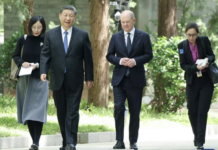Geneva, Dec 8–The World Health Organization said on Monday a robust and very strong safety monitoring system is in place for vaccines globally to ensure their safety.
Kate O’Brien, director of the WHO’s Department of Immunization, Vaccines and Biologicals, said the system is capable of looking at relevant data in real time.
“So, if there is any concern around the vaccine, we have the ability to look at that and to investigate it and to really understand if there is really any issue,” she said during a virtual news conference in reply to a question about hesitancy among some people to take new vaccines for the novel coronavirus.
O’Brien emphasized the fact that safety is a critical part of the evidence that is assessed by regulators during large-scale clinical trials.
And she noted that vaccine hesitancy and questions about vaccines can be legitimate, but that people need to make sure the information they are basing decisions upon is rooted in science.
She also emphasized the importance of sharing information and of transparency throughout the regulatory process.
O’Brien said vaccines can become a critical tool in the toolbox of interventions.
And she repeated the WHO’s observation that a vaccine is not akin to a switch that will end the pandemic.
She said people will continue to need to observe public health interventions for some time because of issues around vaccine supply and other factors.
According to a Pew Center survey, people in the United States intent on getting a COVID-19 vaccine rose to 60 percent in late November, from 51 percent in September, indicating confidence in research and development processes has increased. Around 20 percent are “pretty certain” they will not get vaccinated, however, even if there is more information available.
The survey was conducted among more than 12,000 adults.
The US is the country that has been hardest hit by the novel coronavirus and has reported more than 14.8 million cases and 282,500 deaths, according to the Johns Hopkins University.
In an Ipsos survey in October, only one in five citizens surveyed globally said they wanted to get a COVID-19 vaccine immediately after one became available. In most countries, many people said they would like to have the vaccine a few months after it is rolled out.
The United Kingdom will start its vaccination program on Tuesday, a process that has been described as the “largest and most complex vaccination campaign in the country’s history”.
The UK’s record-breaking approval of the vaccine’s use and the rapid start of its immunization program does not, however, mean the end of the pandemic is in sight, Stephen Powis, NHS England’s medical director, told the Guardian newspaper.
“It would be a marathon and not a sprint,” he said of the vaccine developed by Pfizer/BioNTech.
He went on to tell Sky News: “It will take many months for us to vaccinate everybody who needs vaccination.”



















